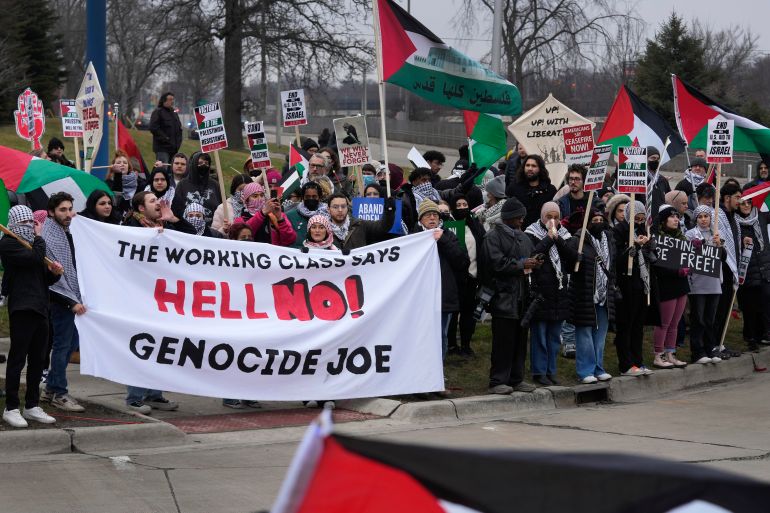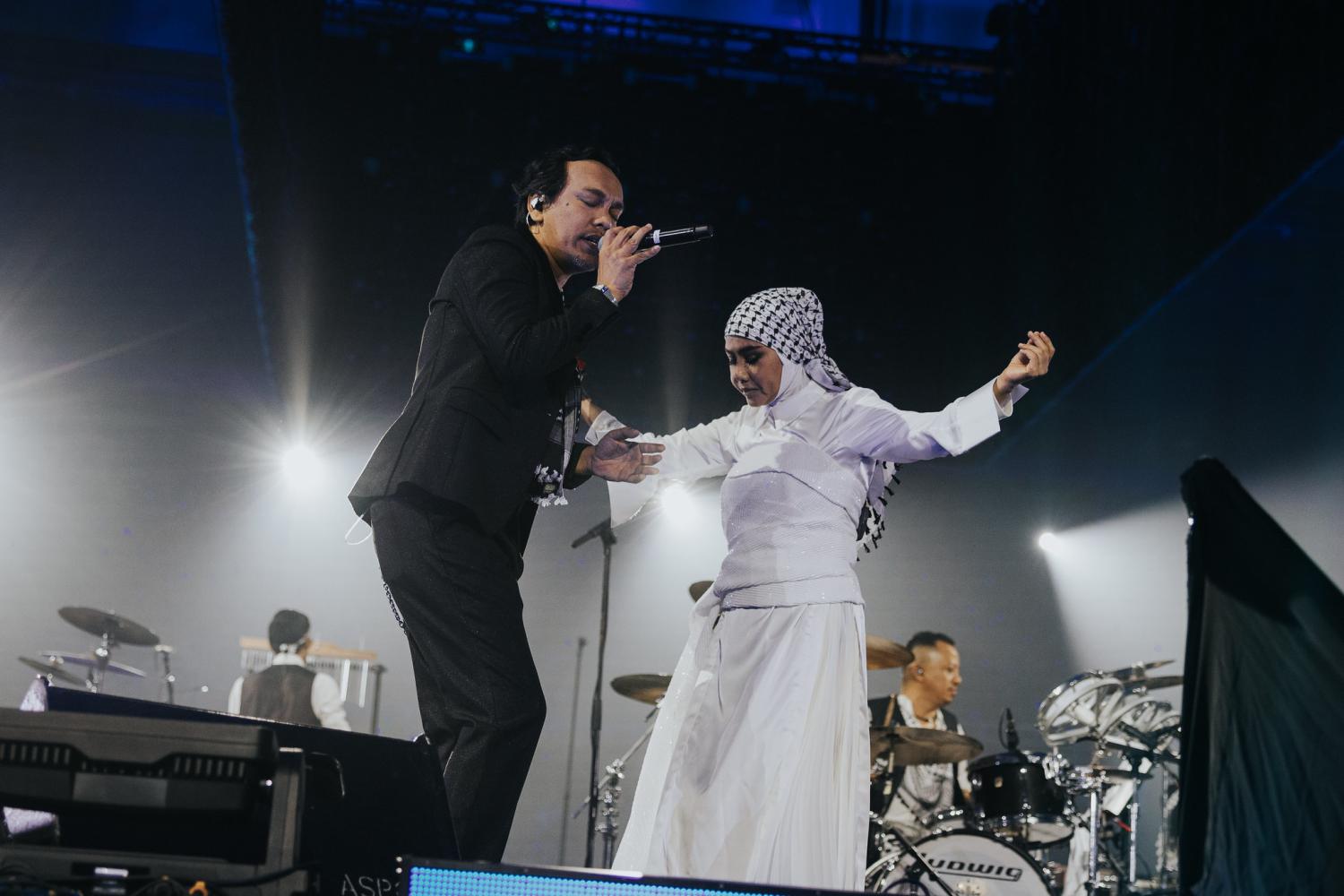"The criminalization policy of the state organs paves the way for racist attacks by racist people and circles," said the Bremen Democratic Kurdish Community Center, reacting to the threat with a bullet with the word SS written on it.
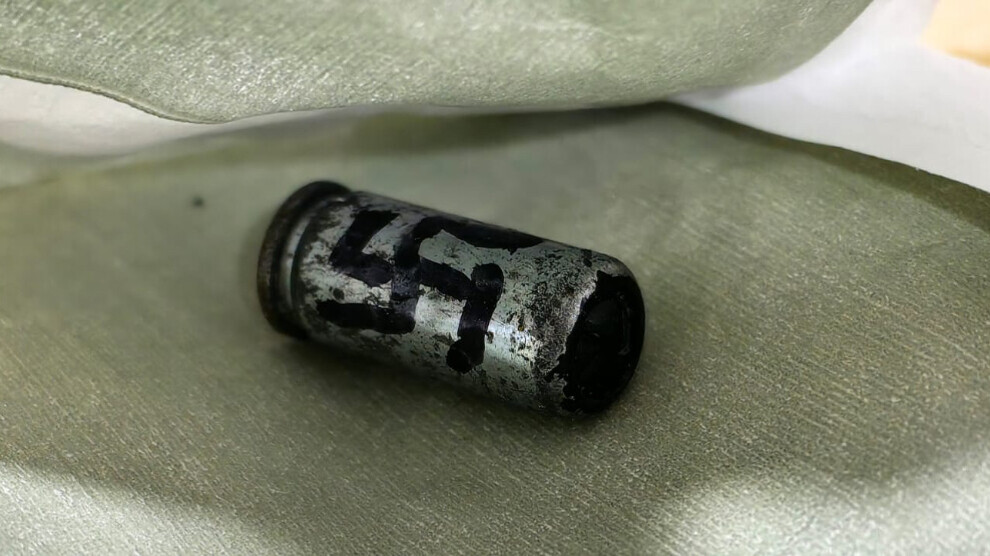
ANF
BREMEN
Sunday, 25 Feb 2024,
Four days ago, cartridges bearing a swastika were discovered in the letterbox of the Kurdish association Biratî in Bremen. The association's premises in Bremen's Neustadt district are under constant surveillance by the police. This is known from various criminal proceedings against alleged PKK cadres. The surveillance logs from the past even contain details of who smoked a cigarette or drank tea in front of the club and when.
In a written statement, the Kurdish Democratic Community Center said, "On November 23, 2023, a letter was sent to Kurdish businesses in Bremen saying, 'I will blow you up'. On February 21, 2024, a letter containing bullets with the word SS and a swastika was left in the mailbox of the Bremen Kurdish Community Center Brati."
The statement said: "Kurds are the most organized community living in Germany. They are among the largest immigrant group in the State of Bremen. As part of Bremen society, the Kurdish community is an integral part of the multicultural structure of the city. However, the recent discriminatory, criminalizing and threatening practices against the Kurdish community in the city of Bremen have caused great reaction in our society in Germany in general and in Bremen in particular after the details of the anti-immigrant and racist meeting organized by the AfD and right-wing groups in Potsdam in November were covered by the press.
Millions of people in favor of democracy, human rights and a multicultural life took to the streets and reacted by saying "Never Again". The reaction of the German society has brought some relief to the Kurdish community, which is part of the immigrant communities and has become part of Germany. As a matter of fact, Kurds are subjected to many racist attacks in Germany. A look at the identity of those murdered in Hanau with racist delusions will reveal the Kurds' uneasiness. On the other hand, at a time when the AfD is on the rise, we observe that the criminalization policy against Kurds is being continued by state organs. It should not be forgotten that the criminalization policy of state organs paves the way for racist attacks by racist individuals and circles. Thus, Kadri Saka was arrested on January 13, the Kurdish Community Center in Bremen was raided. On February 21, a threatening letter with a bullet was left at the Kurdish Community Center, indicating that racists have an opportunity to send threatening messages.
As Kurds living in Germany, we demand the following from the German state organs: Stop criminalizing us!
Investigate racist attacks and threats against the Kurdish community and share all findings with us in detail.
Show the same sensitivity to anti-Kurdish racism as you do to anti-Semitism and protect Kurdish institutions."
Naela Quadri: Kurdish women's struggle against ISIS is a historic epic
Naela Quadri, the Prime Minister of the Balochistan government-in-exile, stated that the Balochi people are struggling against oppression just like the Kurdish people.
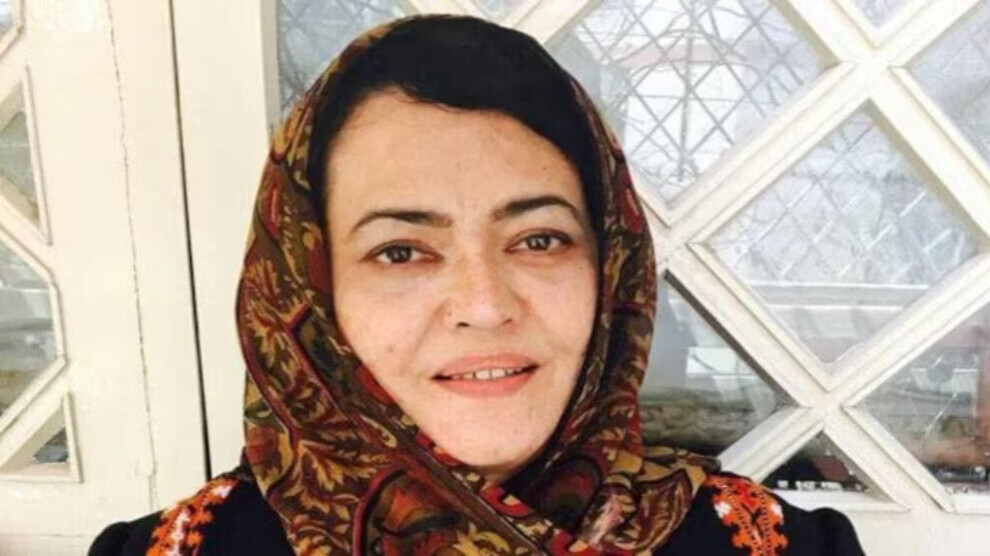
SEYÎD MISTEFA
CAIRO
Saturday, 24 Feb 2024, 13:11
Balochis living in Pakistan, Iran and Afghanistan have been subjected to attacks and persecution by these states for years. The Balochi people, who have been struggling for their rights against attacks for many years, are still being massacred. Naela Quadri, the Prime Minister of the Balochistan government-in-exile, spoke to ANF about the experiences of the Balochi people.
When was the Balochistan government-in-exile established and what is its purpose?
The Government of Balochistan-in-exile was established in 2016. On March 21, 2022, we established diplomatic relations with international institutions, including the United Nations, and human rights organizations that support the liberation of Balochistan. The Balochi issue is not an internal issue in Iran, Afghanistan and Pakistan. The Baloch people want self-rule in their country. Our goal is to liberate Balochistan and establish a democratic and peaceful state. All surface and underground resources should be shared equally by the people of Balochistan. We are fighting for 60 million Balochistanis to get their rights.
How do you evaluate the attacks and rights violations against the Baloch people?
There are serious criminal attacks against the Baloch people. The states of Iran and Pakistan continue to persecute the Baloch people. The Baloch people are facing genocide as defined in Article 2 of the United Nations Convention on the Prevention and Punishment of the Crime of Genocide. Hundreds of old graves have been found where the bodies of slaughtered women, children and men were dumped. Doctors who examined these graves found that the victims had been buried alive. Counter-terrorism management is itself an instrument of terror. There are also hundreds of unmarked bodies riddled with bullets and tortured. The bodies of thousands of Baloch were found mutilated. In October 2022, nearly 500 bodies were found on the roof of Noshtar Miltan hospital. At the same time, the Pakistani army has tortured and raped many Baloch women.
How do you see the struggle of Kurdish women against ISIS gangs?
The struggle of Kurdish women against ISIS is a historic epic in the world, an unforgettable story of these women defending their honor and sacrificing their lives. Kurdish women are a very important example in the world in terms of struggle. We hope that the women of the world will be like Kurdish women. The resistance and strength of Kurdish women cannot be measured.
RAWA: We take courage from our Kurdish sisters
The Revolutionary Association of the Women of Afghanistan issued a message for the internationalists in Rojava on the anniversary of the International Conspiracy against Kurdish People's Leader Abdullah Öcalan.
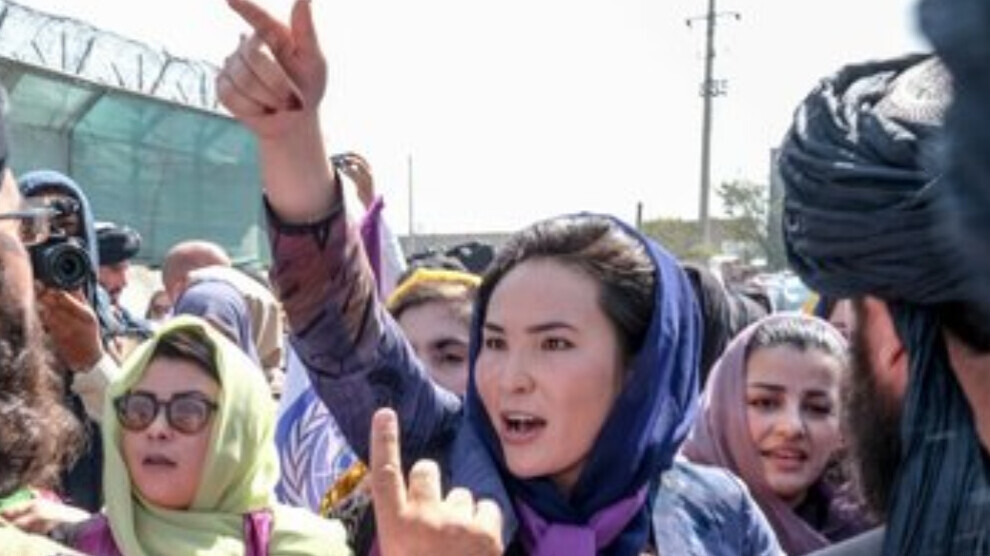
ANF
NEWS DESK
Sunday, 18 Feb 2024, 15:47
The Revolutionary Association of the Women of Afghanistan (RAWA) sent a message to the internationalist women struggling in Rojava on the occasion of the 25th anniversary of the international conspiracy that led to Kurdish leader Abdullah Öcalan’s abduction from Kenya and handover to Turkey on 15 February 1999.
The RAWA's message includes the following:
"To Dear Internationalist Women Comrades in Rojava,
We, the Revolutionary Association of the Women of Afghanistan, advocate united struggle and solidarity for the release of Abdullah Öcalan and all political prisoners.
For more than half a century, Afghan women have been living under the heavy burden of imperialism and oppressive fundamentalist regimes. Recently, the Taliban regime has further oppressed women and ignored everything related to them. It has usurped women's rights and dignity, confined them to their homes and imposed compulsory head covering, arresting those who do not comply.
Despite all, Afghan women, like their fellows around the world, resist imprisonment, violence and threats.
The bond between the Kurdish and Afghan peoples is not formed by common suffering. The bond between us is determined by common resistance and determination. We take courage from our Kurdish sisters who fight shoulder to shoulder with their male comrades.
Mr. Öcalan's leadership has shown that women have the power to change themselves and society.
To honor our imprisoned comrades and in memory of the fallen heroes, we must continue our work until freedom and justice prevail in our land. As imperialism and religious extremism join forces against us, we must stand together as revolutionaries and fighters against occupation, misogyny and injustice.
Let us build a future free of prison and torture in solidarity!"
Freedom and Democracy Rally: We will break the door of Imrali!
Speaking at the "Freedom and Democracy" rally organized in Esenyurt, Istanbul, DBP Co-Chair Keskin Bayindir said, "We will break the door of Imrali and provide a solution. We do not accept this isolation."
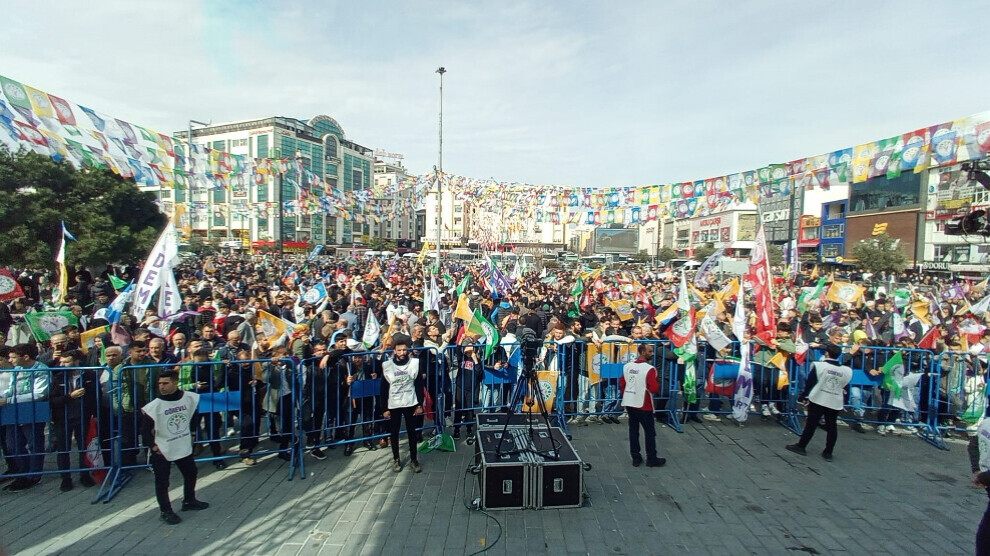
ANF
ISTANBUL
Sunday, 25 Feb 2024, 18:04
The "Freedom and Democracy" rally organized by the Peoples' Equality and Democracy Party (DEM Party) Istanbul Provincial Organization on Sunday saw the participation of thousands of people.
The rally was also attended by politicians who staged the "Great Freedom March" to demand the physical freedom of Abdullah Öcalan, who is held in total isolation in Imrali Island Prison in the Sea of Marmara and has not been heard from for 35 months.
The Great Freedom Marchers took the stage together with the mothers holding a Justice Watch with the same demand and greeted the masses.
Democratic Regions Party (DBP) Co-Chair Keskin Bayındır demanded freedom for Kurdish People's Leader Abdullah Öcalan in his speech at the rally.
Bayındır, who also took part in the "Great Freedom March" launched for the physical freedom of Abdullah Öcalan and a solution to the Kurdish question, recalled that thousands of people had to migrate to metropolises in Turkey due to the burning of Kurdish villages 30 years ago.
"They were saying that they would destroy the Kurds and Kurdish organizations. Those who said this; look at this square, look at this state of organization, look at this freedom square," Bayındır said.
Referring to the Great Freedom March staged in Kurdistan between February 1-15, Bayındır said, "We came together with our heroic and resilient people in Kurdistan, province by province, district by district, village by village. Today, Istanbul is giving voice to this march for freedom. Kurdistan and Turkey are saying 'freedom' for Kurds and Kurdish People's Leader Abdullah Öcalan."
Noting that Kurdish was labeled as an "unknown language" in the Parliament of Turkey, Bayındır said, "Today we speak our language in the squares in Istanbul. They say 'speak Kurdish, but speak it at home.' Today we speak our language here. We are Kurds, we are from Kurdistan."
Referring to the hunger strike of PKK and PAJK prisoners in Turkish prisons, which has been ongoing since 27 November , Bayındır said: "Today is the day of freedom and winning. Today is the day to stand up. Today is our day. This is our time. There has been a hunger strike in prisons for 3 months. Thousands of our comrades are on hunger strike in tens of prisons. They are resisting in dungeons, we are resisting on the streets. We send greetings to those resisting in prisons. We resist oppression. For 100 years we have not bowed our heads and we will not bow today. This stance will definitely reach its goal. Those who miscalculate, those who think they can subjugate the Kurds should look at this square."
Bayındır stated that Kurdish People's Leader Abdullah Öcalan is the interlocutor for the solution of the Kurdish question and continued: "He is not far away. He is in İmralı. We will break the door of Imrali and provide a solution. We do not accept this isolation. If you don't want war and enmity, lift this isolation. The interlocutor of the Kurdish people is clear. And that is Mr. Öcalan. We send greetings to İmralı from here. Our struggle in Kurdistan will succeed. Do not make wrong calculations. Kurds want their rights. Kurds want a solution to the problem with their interlocutors."
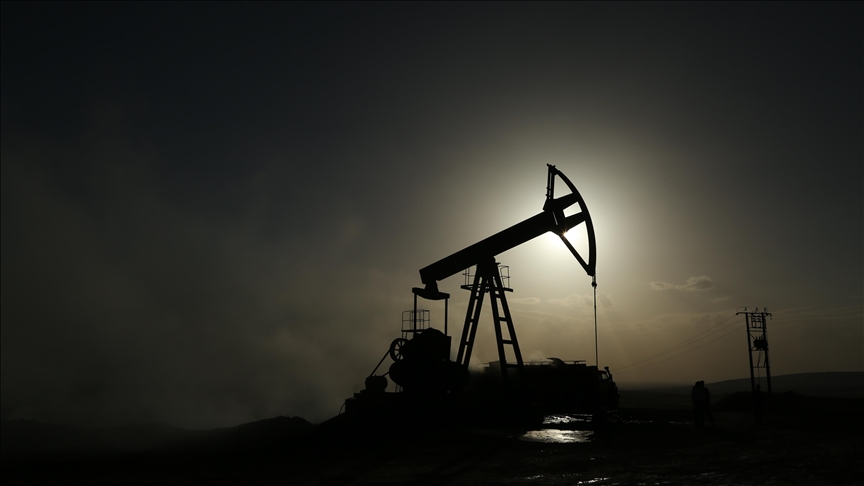




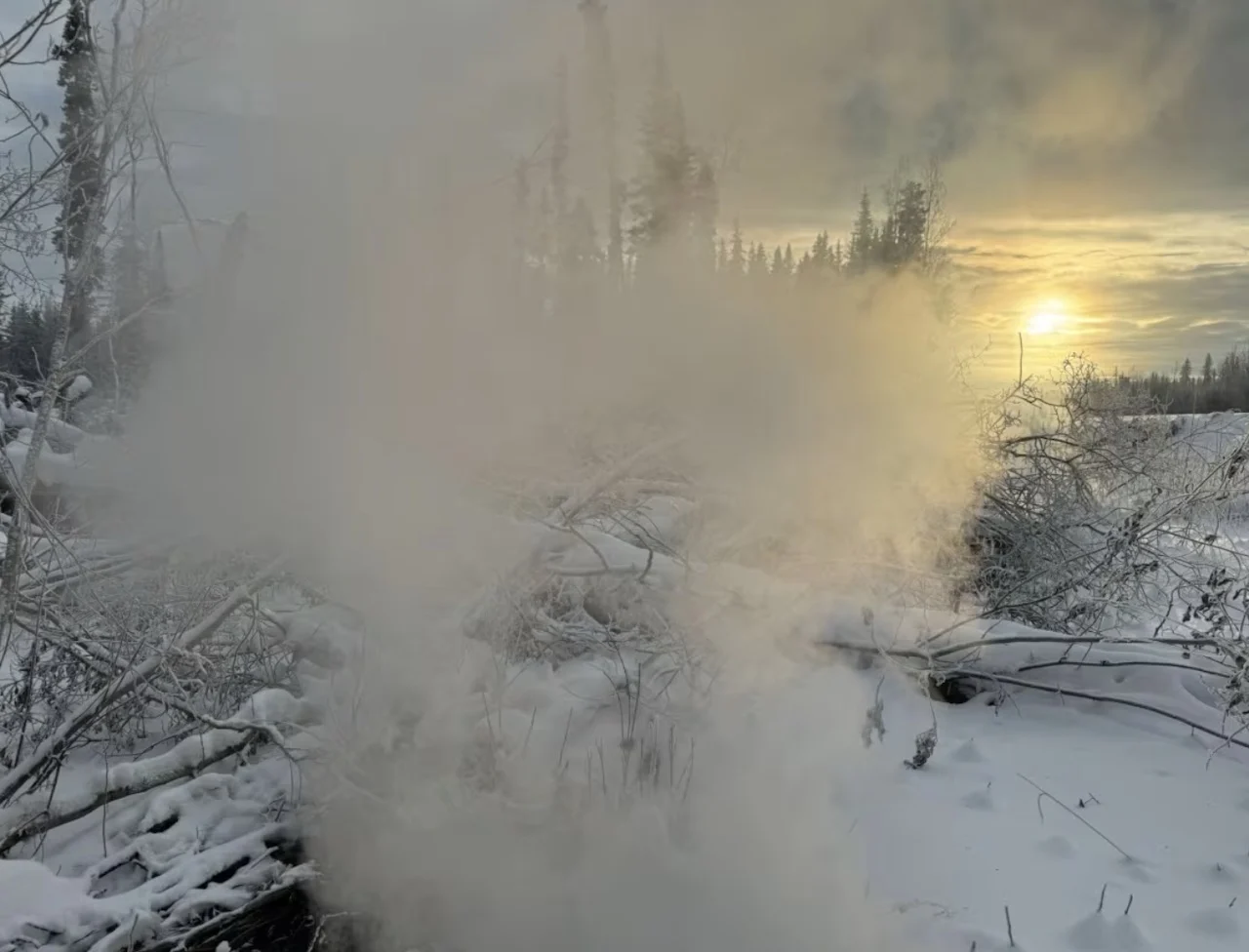

 CobBauge test wall section at the University of Plymouth, showing the interlocking materials –Hudson Architects / SWNS
CobBauge test wall section at the University of Plymouth, showing the interlocking materials –Hudson Architects / SWNS

